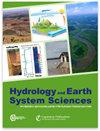Bayesian parameter inference in hydrological modelling using a Hamiltonian Monte Carlo approach with a stochastic rain model
IF 5.8
1区 地球科学
Q1 GEOSCIENCES, MULTIDISCIPLINARY
引用次数: 2
Abstract
Abstract. Stochastic models in hydrology are very useful and widespread tools for making reliable probabilistic predictions. However, such models are only accurate at making predictions if model parameters are first of all calibrated to measured data in a consistent framework such as the Bayesian one, in which knowledge about model parameters is described through probability distributions. Unfortunately, Bayesian parameter calibration, a. k. a. inference, with stochastic models, is often a computationally intractable problem with traditional inference algorithms, such as the Metropolis algorithm, due to the expensive likelihood functions. Therefore, the prohibitive computational cost is often overcome by employing over-simplified error models, which leads to biased parameter estimates and unreliable predictions. However, thanks to recent advancements in algorithms and computing power, fully fledged Bayesian inference with stochastic models is no longer off-limits for hydrological applications. Our goal in this work is to demonstrate that a computationally efficient Hamiltonian Monte Carlo algorithm with a timescale separation makes Bayesian parameter inference with stochastic models feasible. Hydrology can potentially take great advantage of this powerful data-driven inference method as a sound calibration of model parameters is essential for making robust probabilistic predictions, which can certainly be useful in planning and policy-making. We demonstrate the Hamiltonian Monte Carlo approach by detailing a case study from urban hydrology. Discussing specific hydrological models or systems is outside the scope of our present work and will be the focus of further studies.基于随机降雨模型的哈密顿蒙特卡罗方法在水文建模中的贝叶斯参数推断
摘要水文学中的随机模型是进行可靠概率预测的非常有用和广泛的工具。然而,只有首先将模型参数与测量数据在一致的框架(如贝叶斯模型)中进行校准,即通过概率分布来描述关于模型参数的知识,这些模型才能准确地进行预测。不幸的是,使用随机模型的贝叶斯参数校准(即推理)通常是传统推理算法(如Metropolis算法)在计算上难以解决的问题,这是由于昂贵的似然函数。因此,过高的计算成本往往通过采用过于简化的误差模型来克服,这导致参数估计有偏差和预测不可靠。然而,由于最近算法和计算能力的进步,完全成熟的随机模型贝叶斯推理不再是水文应用的限制。我们在这项工作中的目标是证明具有时间尺度分离的计算效率高的哈密顿蒙特卡罗算法使随机模型的贝叶斯参数推断可行。水文学可以潜在地利用这种强大的数据驱动推理方法,因为模型参数的合理校准对于做出稳健的概率预测至关重要,这在规划和决策中肯定是有用的。我们通过详细的城市水文学案例研究来展示哈密顿蒙特卡罗方法。讨论具体的水文模型或系统超出了我们目前工作的范围,将是进一步研究的重点。
本文章由计算机程序翻译,如有差异,请以英文原文为准。
求助全文
约1分钟内获得全文
求助全文
来源期刊

Hydrology and Earth System Sciences
地学-地球科学综合
CiteScore
10.10
自引率
7.90%
发文量
273
审稿时长
15 months
期刊介绍:
Hydrology and Earth System Sciences (HESS) is a not-for-profit international two-stage open-access journal for the publication of original research in hydrology. HESS encourages and supports fundamental and applied research that advances the understanding of hydrological systems, their role in providing water for ecosystems and society, and the role of the water cycle in the functioning of the Earth system. A multi-disciplinary approach is encouraged that broadens the hydrological perspective and the advancement of hydrological science through integration with other cognate sciences and cross-fertilization across disciplinary boundaries.
 求助内容:
求助内容: 应助结果提醒方式:
应助结果提醒方式:


